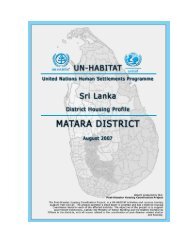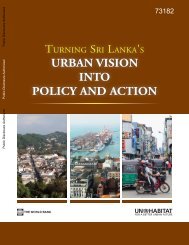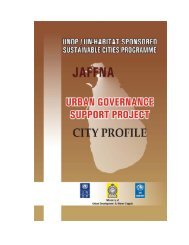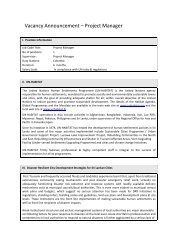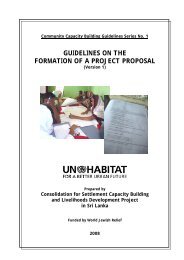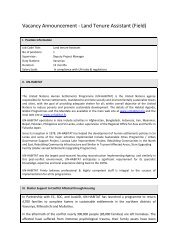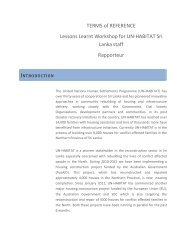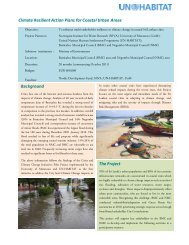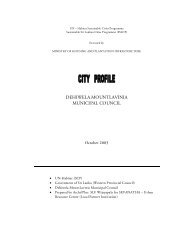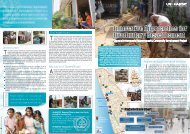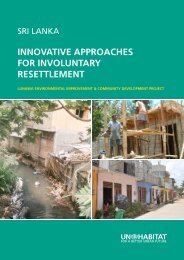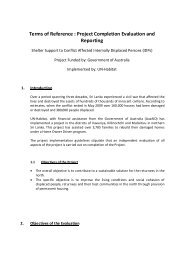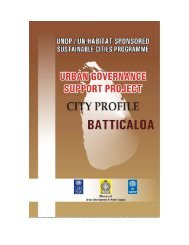Conference Proceedings : âJANASEVANAâ National ... - UN HABITAT
Conference Proceedings : âJANASEVANAâ National ... - UN HABITAT
Conference Proceedings : âJANASEVANAâ National ... - UN HABITAT
You also want an ePaper? Increase the reach of your titles
YUMPU automatically turns print PDFs into web optimized ePapers that Google loves.
the poor are the worst affected group while metropolitan suburbs are the worst affected areas. When considering<br />
housing by tenure, low income, private renters are the worst affected.<br />
The Way Forward for Housing in Sri Lanka<br />
Delivering cost effective, not‐for‐profit housing is a major need in Sri Lanka. It is necessary to build on local networks<br />
and apply innovative approaches to achieve the targets of social housing. It should strengthen and develop<br />
communities and have adequate flexibility to respond to different housing needs. Leveraging the private sector and<br />
other forms of investment is needed to deliver more housing to the people. Supporting an improved social mix on<br />
large scale estate renewal projects, helping to promote community housing, responding to future growth<br />
opportunities for housing e.g. property transfers, were identified as priority issues.<br />
In conclusion, it was felt that housing problems cannot be solved by simply providing demand‐based subsidies to<br />
lower income households. New models of supply and management which involve greater partnerships between the<br />
public and private sector and more involvement by households were identified as a prerequisite to successful<br />
investment in housing – as well as new and more flexible forms of tenure. It was stressed that housing cannot be seen<br />
as separate from broader issues of sustainability and economic viability in cities or as separate from problems of<br />
worsening distribution of income and growing problems of social cohesion.<br />
Social Housing, Regulatory Framework and Urban Planning<br />
Ms.Indu Weerassori, Deputy Director General (Planning), Urban Development Authority<br />
Ms.Weerassori, presenting the perspectives of an urban planner on social housing, discussed Sri Lanka’s housing<br />
regulations. She mentioned that there is a pervasive, popular view that developing countries are undergoing rapid<br />
rates of urbanization. However, compared to many Asian countries, Sri Lanka displays a relatively slow urbanization<br />
pattern. Due to prevailing patterns, the population has moved from rural to urban areas, in search of employment<br />
opportunities and better facilities. The natural increase of the population caused by migration increases the<br />
population in urban areas, where there is high land scarcity. The demand for housing is one of the most pressing<br />
issues in the urban landscape. Adequate housing becomes an essential pre‐requisite in every human settlement. She<br />
stressed that a house is not simply a structure with four walls, but should be packaged with other amenities and<br />
facilities.<br />
The scarcity of developed land and housing sites, rising cost of construction materials, high wage rates, shortage of<br />
services and amenities (e.g. water and sanitation) has pushed the housing cost beyond the reach of most Sri Lankans.<br />
As a result, a large number of people, especially those in the lower income groups, have been unable to afford suitable<br />
shelter. This is an area where Government intervention is urgently needed. In Sri Lanka, all successive Governments<br />
have identified steps to contribute to the housing sector in numerous ways and the provision of social housing for<br />
needy people has been identified as one of the main solutions to the housing shortage.<br />
Historical Land Marks/ Milestones in the Social Housing Sector<br />
Several historical milestones on the social housing sector in Sri Lanka were shared with the forum. These included the<br />
establishment of a separate Ministry and Department (<strong>National</strong> Housing Department) of housing in 1953 and the<br />
construction of multi‐storey buildings by the Government as a solution to the housing problem. In 1973, a ceiling on<br />
housing and property law was applied. A separate authority on housing ‐‐ <strong>National</strong> Housing Development Authority<br />
(NHDA) was established in 1978 and the GOSL also launched the “Million Houses Programme”, which included the<br />
upgrading of slums and shanties. These programmes resulted in the construction of houses throughout the country. In<br />
1979, the <strong>UN</strong>ICEF Urban Basic Services Programme was launched and in 1998 the REEL (Real Estate Exchange Ltd) and<br />
Urban Service Improvement Project were established. In 2008, the Urban Settlement Development Authority was<br />
established by the GOSL.<br />
<strong>Conference</strong> <strong>Proceedings</strong> – <strong>National</strong> Housing Symposium 10



